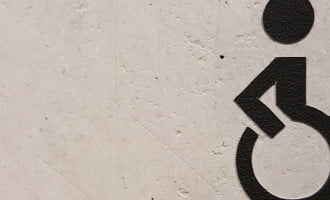Health professionals often recommend us to help their clients with workstation related Musculoskeletal conditions. There are many treatments available to help with the aches and pains associated with the ever-increasing time we spend sitting at our desks, however, it’s not always easy to decide what would be best for each individual condition. Wanting to know more about the benefits of these treatments, we spoke to registered Osteopath Carla-Maria Hole M.Ost from Bright Osteopathy about what Osteopathy is and how it can help.
“Osteopathy is a hand’s on based therapy, which works with your neuromusculoskeletal system – that’s your muscles, joints, ligaments, bones & nerves. The goal with osteopathic treatment is to restore your body to a state of balance and to do this where possible without the use of drugs or surgery.
Osteopathy is well known for treating lower back pain but it can also treat neck pain, shoulder issues, hip, knee and ankle problems
Osteopaths use palpation (feeling through our hands) & diagnostic procedures used by other medical professionals to help us identify mechanical problems within the body. We look for primary symptoms and secondary symptoms. The primary symptom is the cause, it’s the structure that makes others work harder & it’s then these structures that get tired and start to become painful or achy. Our bodies are very good at compensating, in fact, different parts of our bodies are constantly being corrected and tweaked to help other areas out. Sometimes the cause of your symptoms isn’t always in the area that’s painful.
One of the main aims of osteopathic treatment is to restore optimal function and a sense of balance to the body: to get structures in your body to work harmoniously together
One of the osteopathic principles is that your body is its own medicine chest, meaning we all have it within us to heal ourselves, it’s just sometimes things go out of sync and we cant sort ourselves out. A lot of us survive on quite a high proportion of stress for most of our day/week/ year which our bodies are not designed to do. This chronically stressed state has effects on your body and reduces its ability to cope with different issues. So when you do something simple that you’ve done a hundred times before but that day you’ve had a particularly stressful day at work it might be then that an injury can occur, because your body isn’t able to adapt.
The good news is there are some simple changes you can make to help your body out:
- Be as active as you can. 10,000 steps per day are the recommended amount. Maybe walk or cycle to work, on your break go out for a walk instead of checking your phone, use the stairs, not the lift, get off the bus a stop earlier and walk the extra. It’s an achievable goal, but you would be surprised at how many of us don’t make it anywhere near 10,000 steps!
- Make sure your workstation is well set up for you & move /change your position regularly. Go get a glass of water, stand up (if you have a desk that can change between sitting & standing) regularly. Your body is designed to move, not stay stationary for long periods of time.
- Diet – this is a complicated area because what might suit one person might not suit another. Address sugar and caffeine intake, as these will affect your concentration levels.
- Stress levels – these words are used all the time and I think we’ve all become so used to them that they don’t mean much to us anymore. Long-term stress can change our physiology, which means our bodies work & respond differently to long term stress than if we only experience the ‘stress’ for a short period of time. So this is a hugely important point to address and change where you can
- Focus on your breathing, even if it’s for 5 minutes a day. Stress makes us breath shallower, lie down and take a few deep breaths, concentrating on making your stomach expand and using the lower part of your ribcage.
- Leave your stress at work! Don’t take work home with you, turn your phone/emails off so you can’t be contacted at all times. It’s important to have clear spells of time where you’re not worrying /thinking about work. This can have an effect on your sleep, which in turn can impact on your day
- Think prevention not cure. This is quite unknown to most of us but whatever you might think you’re not invincible. We generally only do something once we’re in pain and then we want it to go away as quickly as possible. Why not look after yourself to stop the pain occurring in the first place? That doesn’t have to be osteopathic treatment, but taking time out to look after yourself is important. Whether that’s making enough time to go for a long walk in the sunshine or going to get a massage it’s important to make time to look after yourself. This also goes for your desk set up; why wait until your neck/ shoulder/ lower back is in pain, get an assessment before it gets to that point, you will usually get quicker results and it might just be cheaper!




